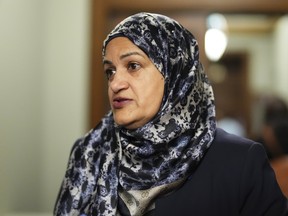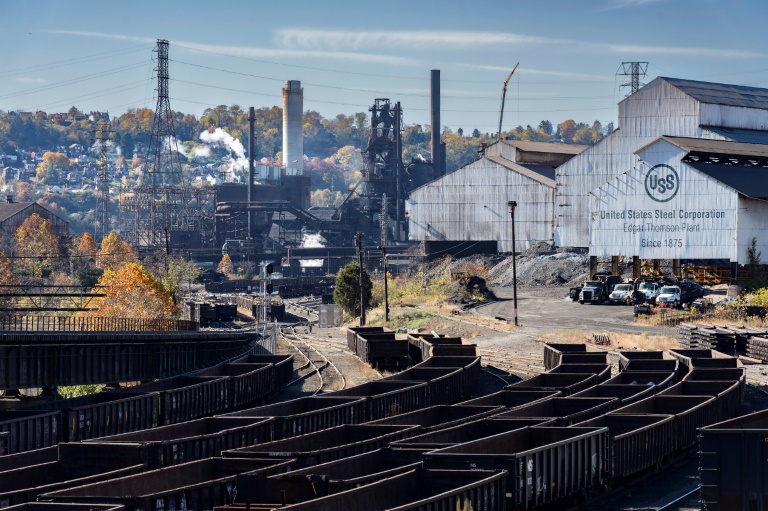Trudeau was criticized for not mentioning anti-Palestinian racism in an update to Canada’s anti-racism strategy
Article content
OTTAWA — Jewish-Canadian groups are voicing concerns after special anti-Islamophobia representative Amira Elghawaby met with Prime Minister Justin Trudeau last week to urge him to adopt a federal definition of “anti-Palestinian racism.”
Critics warn that embracing the concept could end up targeting Jewish Canadians by conflating pro-Israel speech with racism, while insulating pro-Palestinian interpretations of history from criticism.
Advertisement 2
Article content
“While we stand firmly behind protections against discrimination for all communities, including Palestinians, (anti-Palestinian racism) crosses a line by targeting expressions of Jewish identity linked to Israel,” said Richard Marceau, the vice president of external affairs at the Centre for Israel and Jewish Affairs, in a statement to the National Post.
“Holding differing opinions is not a breach of human rights,” continued Marceau.
Elghawaby said in a press release that she met with the prime minister to “highlight how Islamophobia, and its intersections with anti-Palestinian and anti-Arab racism, continues to harm our social fabric, undermines pluralism and poses a direct threat to our democracy.”
She said in the statement that she welcomed Trudeau’s “commitment on adopting a definition of (anti-Palestinian racism) to describe the bias and discrimination far too many Canadian Palestinians are experiencing.”
The Prime Minister’s Office didn’t respond when asked by National Post whether Trudeau plans to follow Elghawaby’s suggestion.
A definition of anti-Palestinian racism put forward by the Arab Canadian Lawyers Association in a spring 2022 report calls it “a form of anti-Arab racism that silences, excludes, erases, stereotypes, defames or dehumanizes Palestinians or their narratives.”
Article content
Advertisement 3
Article content
“Racism is an appropriate construct for describing the experiences of Palestinians,” reads the report. “Israel’s treatment of Palestinians is… at its essence(,) predicated on the superiority and dominance of one group of people over another.”
The definition directly mentions “denying the Nakba”, a term used to characterize the displacement of Palestinians during the 1948 Arab-Israeli War as an act of ethnic cleansing. It also includes “failing to acknowledge Palestinians as an Indigenous people with a collective identity.”
According to the World Jewish Congress, the term “Nakba”, meaning “catastrophe” in Arabic, was coined in reference to the Holocaust, known in the Hebrew-speaking world as the “Shoah”, or “calamity.”
Marceau says putting the two historical events side-by-side, “risks opening the door to Holocaust minimization.”
“These comparisons are problematic because they equate the Holocaust — a systematic, industrial-scale genocide in which six million Jews were targeted and exterminated solely for their identity — with the displacement of approximately 750,000 Palestinians during the 1948 Arab-Israeli war,” said Marceau.
Advertisement 4
Article content
“This framing not only undermines the historical uniqueness and gravity of the Holocaust but also fosters perceptions that Jews are committing atrocities similar to those they endured. By blurring these distinctions, anti-Palestinian racism diminishes the specific trauma of the Holocaust and undermines the educational impact of Holocaust memory.”
Avital Borisovsky, the director of communications for the Friends of Simon Wiesenthal Centre for Holocaust Education, also called the comparison inappropriate.
“Comparing the Holocaust to any other historical event not only distorts and minimizes this dark chapter in history but diminishes its singularity,” said Borisovsky.
Richard Robertson, the director of research and advocacy with B’nai Brith Canada, says he worries that the adaptation of anti-Palestinian racism will lead to a two-tier system of human rights.
“The rights of Jewish Canadians will become secondary to those who wish to advance anti-Zionist narratives,” Robertson told the National Post.
Robertson also pointed to inconsistencies between anti-Palestinian racism and the International Holocaust Remembrance Alliance definition of antisemitism, which he says “enables the combating of forms of anti-Zionism that are manifestly antisemitic.”
Advertisement 5
Article content
The IHRA definition, which the federal government added to its anti-racism strategy in 2019, states that “manifestations (of antisemitism) might include the targeting of the state of Israel, conceived as a Jewish collectivity.”
One example of antisemitism cited in the Canadian Handbook on the IHRA definition is “denying the Jewish people their right to self-determination, e.g., by claiming that the existence of a State of Israel is a racist endeavor.”
Another is “drawing comparisons of contemporary Israeli policy to that of the Nazis.”
Canada’s anti-racism strategy is a multiyear framework that guides federal anti-racism initiatives and the internal anti-racist policies of federal agencies.
Trudeau was criticized by multiple parties, including Liberal MP Salma Zahid, for not mentioning anti-Palestinian racism in an update of the strategy published earlier this year.
Zahid told the National Post she was encouraged by the prime minister’s meeting with Elghawaby.
“I welcome the Prime Minister’s commitment to recognizing and adopting a definition of anti-Palestinian racism,” said Zahid in an email.
Advertisement 6
Article content
“In Canada in recent months, we have seen increasing levels of Islamophobia, anti-Palestinian racism and anti-Semitism. Before we can fight against such hatred, we need to be able to recognize what it is and what it looks like.”
“I look forward to working with the government to move this forward,” said Zahid.
National Post
Recommended from Editorial
Get more deep-dive National Post political coverage and analysis in your inbox with the Political Hack newsletter, where Ottawa bureau chief Stuart Thomson and political analyst Tasha Kheiriddin get at what’s really going on behind the scenes on Parliament Hill every Wednesday and Friday, exclusively for subscribers. Sign up here.
Our website is the place for the latest breaking news, exclusive scoops, longreads and provocative commentary. Please bookmark nationalpost.com and sign up for our daily newsletter, Posted, here.
Article content








